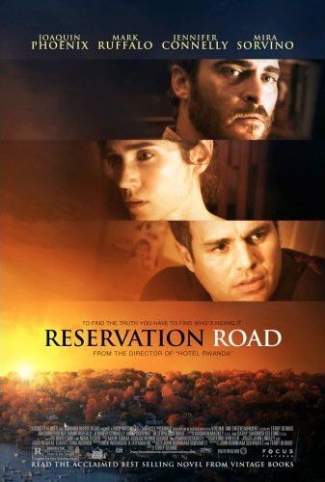
RESERVATION ROAD
US, 2007, 102 minutes, Colour.
Joaquin Phoenix, Mark Ruffalo, Jennifer Connolly, Mira Sorvino, Elle Fanning, Eddie Alderson.
Directed by Terry George.
Reservation Road is a rather harrowing film. It had strong credits but did not receive much cinema release, going straight to DVD. It was probably too much for the average audience who could identify with the characters and the situations and the emotions.
The film establishes two fathers and their relationship with their children. Joaquin Phoenix is a professor, devoted to his children. Mark Ruffalo is a disturbed man, a lawyer, separated from his wife, wanting custody of his son. He also, in a hurry to get home, is the perpetrator of a hit-run accident with the death of Phoenix’s son. He covers up.
Both actors are particularly good in their roles, credible for fathers in anguish for different reasons. Phoenix moves from a sympathetic father, to one obsessed with finding out who the perpetrator was, becoming more consumed with vengeance and alienating himself from his wife (Jennifer Connolly) and his daughter (Elle Fanning). By way of contrast, Ruffalo is callous, erratic and irresponsible, but gradually becomes more humanised by the experience of what he does, taping a confession for his son, finally confronting the angry Phoenix.
There are a number of coincidences in the film which work well enough on screen but, for those who are more literal-minded, it may seem too farfetched. Phoenix goes to a lawyer and hires Ruffaloas an investigator and adviser. In the meantime, his daughter has music lessons from Ruffalo’s ex-wife. The two sons had known each other briefly at school.
However, the writing by novelist John Burnham Schwartz and director Terry George is strong, convincing, powerful and emotional.
While the film focuses on the inadequacies of the justice system and also highlights the desire for vengeance, there is a balance in the different way that Phoenix’s wife handles the situation – and a culmination indicating that violence is not the final answer.
1.The impact of the film, story, characters, harrowing, justice and the law, coping with grief?
2.The Connecticut settings, affluent society, the affluent state and the comments by the college students about Connecticut? The community, the families, homes, school, the police? The scenes on the roads, at the lake, the woods? The musical score?
3.The realism of the themes, for ordinary people, identifying with both sides of the situation?
4.The introduction to Ethan and his family, Josh and his cello-playing, the aftermath of the concert, the bonds in the family, the collecting of the fireflies, the contrast with Dwight, Lucas in himself at the game, his care for his son, late in bringing him home, Ruth’s accusations of irresponsibility, the arguments, Lucas and his living with his mother and her husband? The set-up in paralleling the fathers and the sons? The wives?
5.Travelling home, Ethan, the stop, Josh letting the fireflies loose? Dwight and Lucas, the urgency, the changing the radio station, not putting on his seatbelt, speed, the avoiding of the truck, the hitting of Josh, the driving off immediately?
6.The impact of the hit-run, Ethan and his dismay, Grace and her grief, Emma and her shock? Dwight and his leaving? The police, the interrogations, the interviews, the family going home with their grief?
7.Ethan, in himself, his tutorial and the discussions about media, the wealth of Connecticut, suffering and pain, comparisons? With the police, his growing obsession, his silence, anger and rage? Attitude towards justice and the law? The accusation against the police? Impatience, alienating Grace? Talking and not talking? Photographing the SUV? The arrest, the discussion at the police station? Visiting Dwight and the firm, giving the information? His being sane and not sane?
8.Dwight, the arguments with Ruth? Ruth and Norris with Lucas? The night, his anguish, fear, cowardice? Hiding the car, renting another, going to work, edgy, his boss and the criticism? The irony of Ethan and the investigation? His outings with Lucas? The tape? Confessing to Lucas? Going to the police, their being busy, his not being able to own up? The outings with Lucas to the ball game? With his wife, the drive, the lies? Meeting Ethan, at the site of the crime? The request, taking Lucas to the Red Sox match?
9.Ruth, the piano lessons, her offer to Grace, coaching Emma, Emma playing? Ethan picking up Emma, the photo and the SUV? Ruth giving permission for Dwight to take Lucas out? Talking of his life to Ethan?
10.Grace and her trying to cope, the ordinary woman, asking Emma about the piano lessons, Ethan and his attitude? The performance, trying to talk to Ethan, seeing him go?
11.The police, sympathy, their work, investigations, the visit to Dwight to ask about the car? It belonging to a Saudi diplomat, Ethan suspicious, immunity?
12.Ethan and his decision, taking Dwight to the site, the photo and the recognition? The abduction, the gun, bashing and fight, losing the gun?
13.Dwight and the gun, his holding it to his head, being prepared to die? His fears? His conscience? Ethan going? Lucas and the tape?
14.Ethan driving home? The effect of this experience on him?
15.The reverse sympathy, Ethan growing harder, Dwight becoming more conscience-driven?
16.Ethan and the use of the internet, the solidarity of people who were victims, fostering rage?
17.Justice and the law, vigilante action and its consequences?
18.The resolution with the perpetrator, facing the perpetrator, discussions and dealing with him? The psychological effect, moral effect?